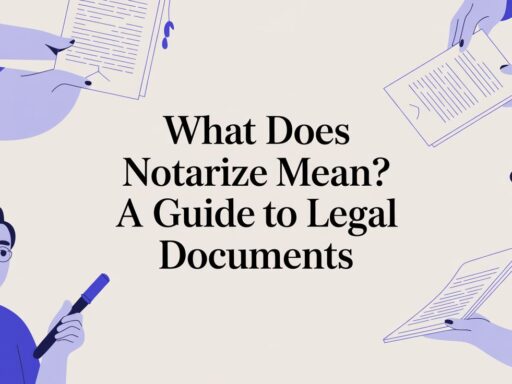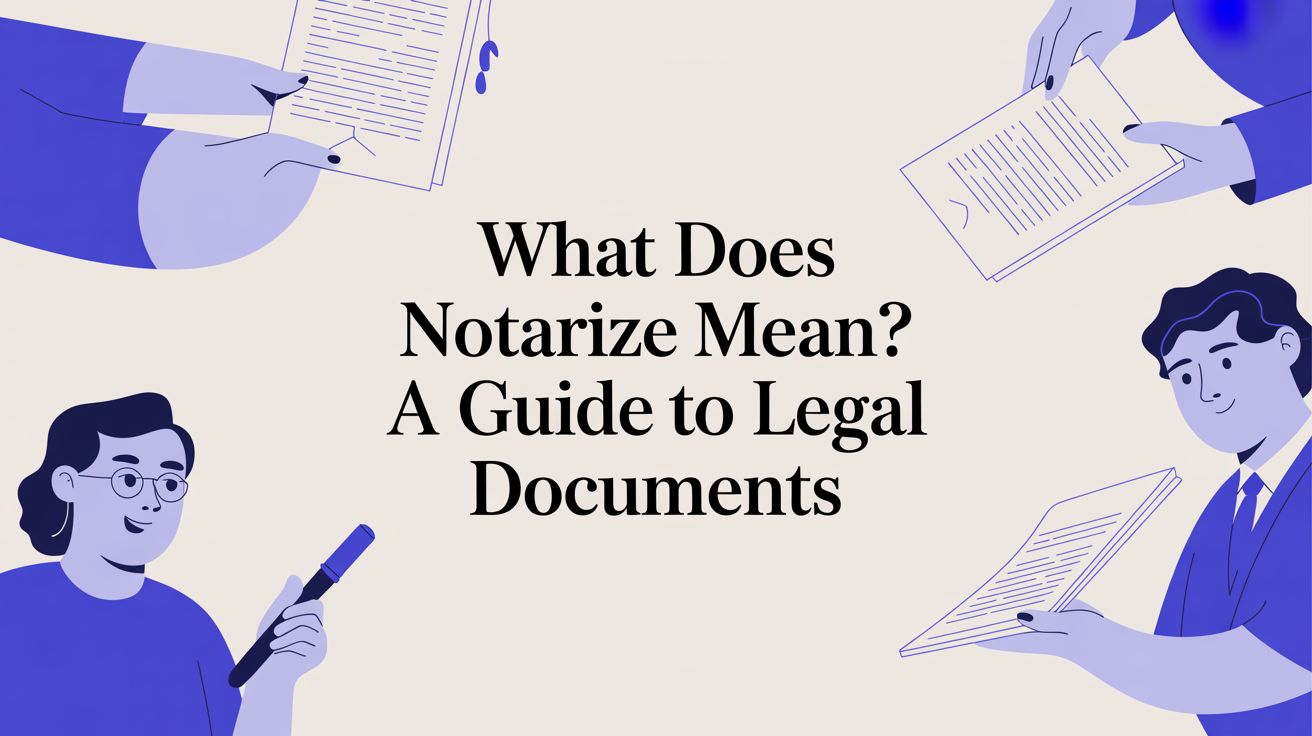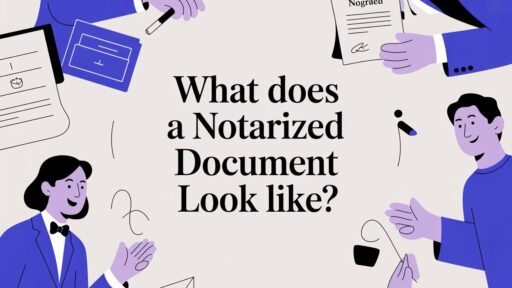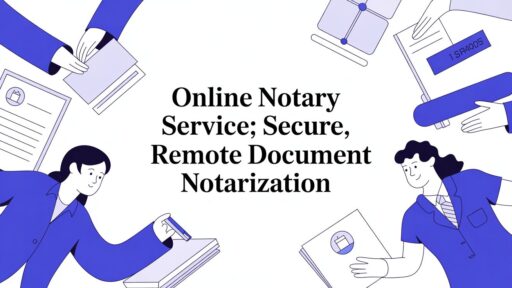To "notarize" a document is to have a state-licensed official, called a Notary Public, formally witness your signature. You can think of a notary as a trusted, impartial third party whose job is to add a layer of legal integrity to your most important paperwork. Their involvement is all about preventing fraud and making sure everyone is signing on the dotted line knowingly and willingly.
What Notarizing a Document Truly Means
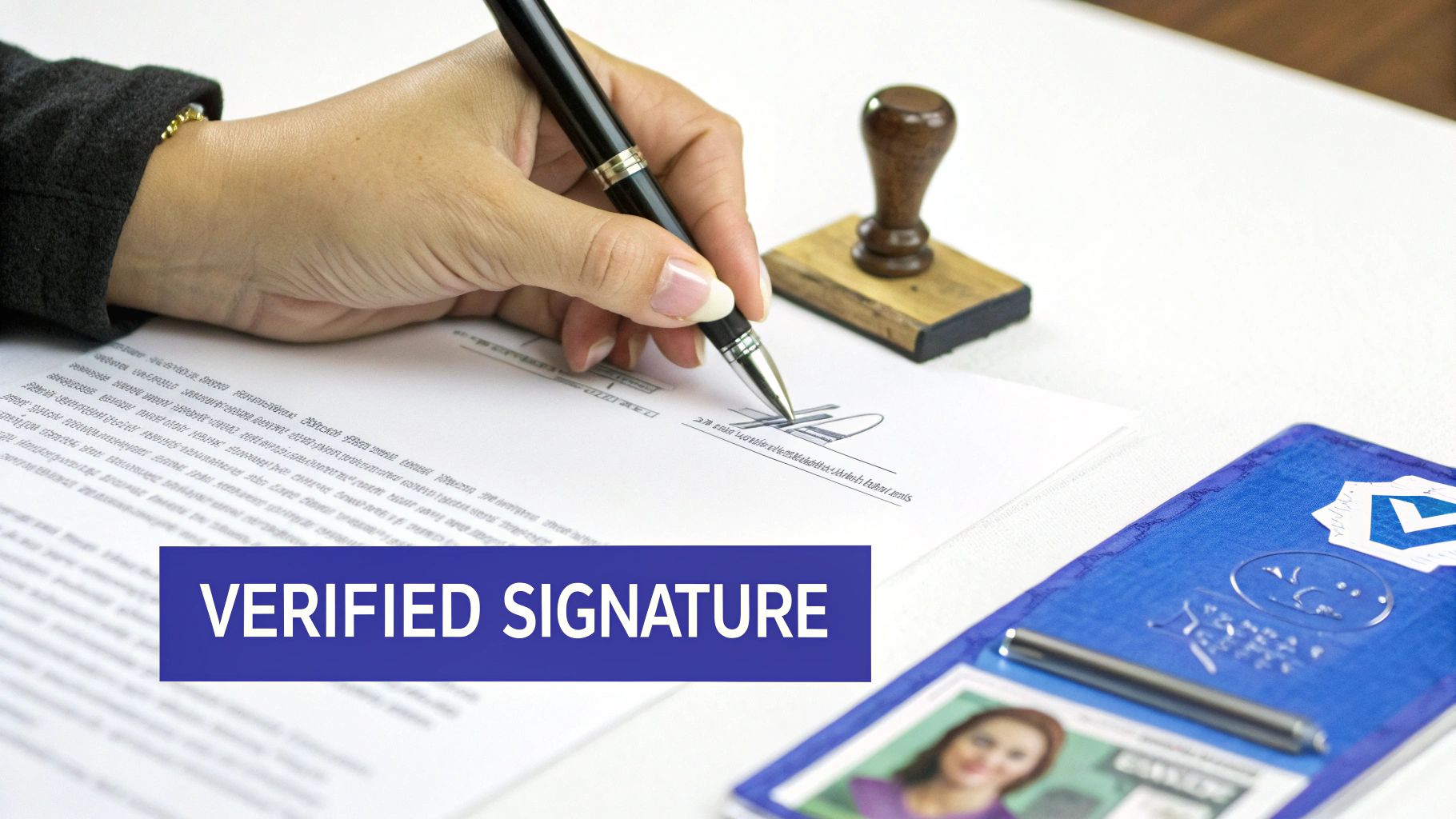
At its heart, notarization is a simple but powerful process that creates a trustworthy record of a signing event. It essentially transforms a regular signature into a legally sound action that becomes very difficult to challenge down the road.
It's important to know that the notary doesn't care about what's in your document—they aren't reading the fine print or offering legal advice. Their focus is entirely on the "who, what, and when" of the signing itself. This provides a critical safeguard for high-stakes agreements involving property, money, or personal legal rights. When a notary attaches their official seal and signature, they are certifying that a specific set of procedures was followed, giving the document a much stronger legal standing.
The Three Core Functions of a Notary
A notary's job really boils down to three key duties, each one designed to protect everyone involved in the transaction from potential fraud or coercion. These functions are the bedrock of what it means to get something notarized.
- Identity Verification: First and foremost, the notary has to confirm you are who you claim to be. This is usually done by checking a government-issued photo ID, like a driver's license or passport. It’s the simplest way to stop someone from signing in another person's name.
- Willing and Aware Signing: The notary also needs to make a basic assessment of the signer's state of mind. They are looking to see that you understand the document you're signing and that nobody is forcing or pressuring you to do it.
- Formal Witnessing: Finally, the notary acts as an official witness to the signature. For some notarial acts, like an acknowledgment, you might just be declaring to the notary that the signature on the document is indeed yours. For others, you’ll have to sign it right there in front of them.
Grasping the different types of notarial acts is helpful. If you want to get into the weeds, you can learn more about an acknowledgment certificate and see how it stacks up against other common forms.
Key Takeaway: Notarization is not about checking the facts or accuracy of what's written in a document. It is 100% about verifying the signer's identity, ensuring their willingness to sign, and officially recording the act of the signature itself.
The notary's role is so fundamental to creating legally durable documents. Here’s a quick breakdown of their core functions in one place.
The Three Core Functions of Notarization
| Function | What It Means | Why It Matters |
|---|---|---|
| Verify Identity | The notary confirms the signer's identity using official identification. | Prevents forgeries and identity-based fraud. |
| Ensure Willingness | The notary confirms the signer is acting freely and without coercion. | Protects vulnerable individuals and upholds the document's validity. |
| Witness Signature | The notary observes the signing or listens to an acknowledgment. | Creates an official, impartial record that the signing took place. |
These three pillars work together to give notarized documents the integrity they need to be trusted by courts, banks, and government agencies.
The Notary Public: A Pillar of Trust Through History
The need for a trusted, impartial witness isn’t some newfangled idea. The role of the notary public actually stretches back thousands of years, forming a bedrock of integrity for society's most critical agreements. This long history is precisely why a notary’s seal carries so much weight today.
Long before modern legal systems, ancient civilizations already knew they needed official record-keepers. Scribes in ancient Egypt and Rome were the original notaries, tasked with drafting and witnessing everything from contracts to wills. Their job was simple but crucial: ensure authenticity and stop disputes before they started. That core function remains exactly the same.
This tradition of verification carried on through the centuries, adapting to the needs of growing societies and budding commerce.
From Ancient Scribes to Modern Officials
The term 'notarize' refers to this timeless process of having a document's authenticity verified, a practice that has evolved quite a bit over time. As societies grew more complex—particularly in the United States during the 19th and 20th centuries—each state developed its own laws to formalize the notary's role.
Today, an incredible 1.25 billion documents are notarized annually in the U.S. alone. That number is a huge testament to the enduring importance of notarization in both legal and commercial life. You can read more about the evolution of notary public practices to see just how far it's come.
This historical journey highlights a key point: the notary has always been a pillar of fraud prevention. Their presence ensures that signers are who they claim to be and that they're entering into agreements willingly, without coercion.
A notary doesn’t just stamp a paper; they uphold a tradition of trust that is centuries old, providing a bridge of integrity between parties in a transaction.
Whether you're meeting a notary in person or connecting with one online through a platform like BlueNotary, you are engaging with a profession rooted in a deep history of ensuring fairness and authenticity. This legacy is what gives modern notarization its legal power and public confidence. The tools may have changed from clay tablets to digital seals, but the mission remains the same.
Comparing In-Person and Online Notarization
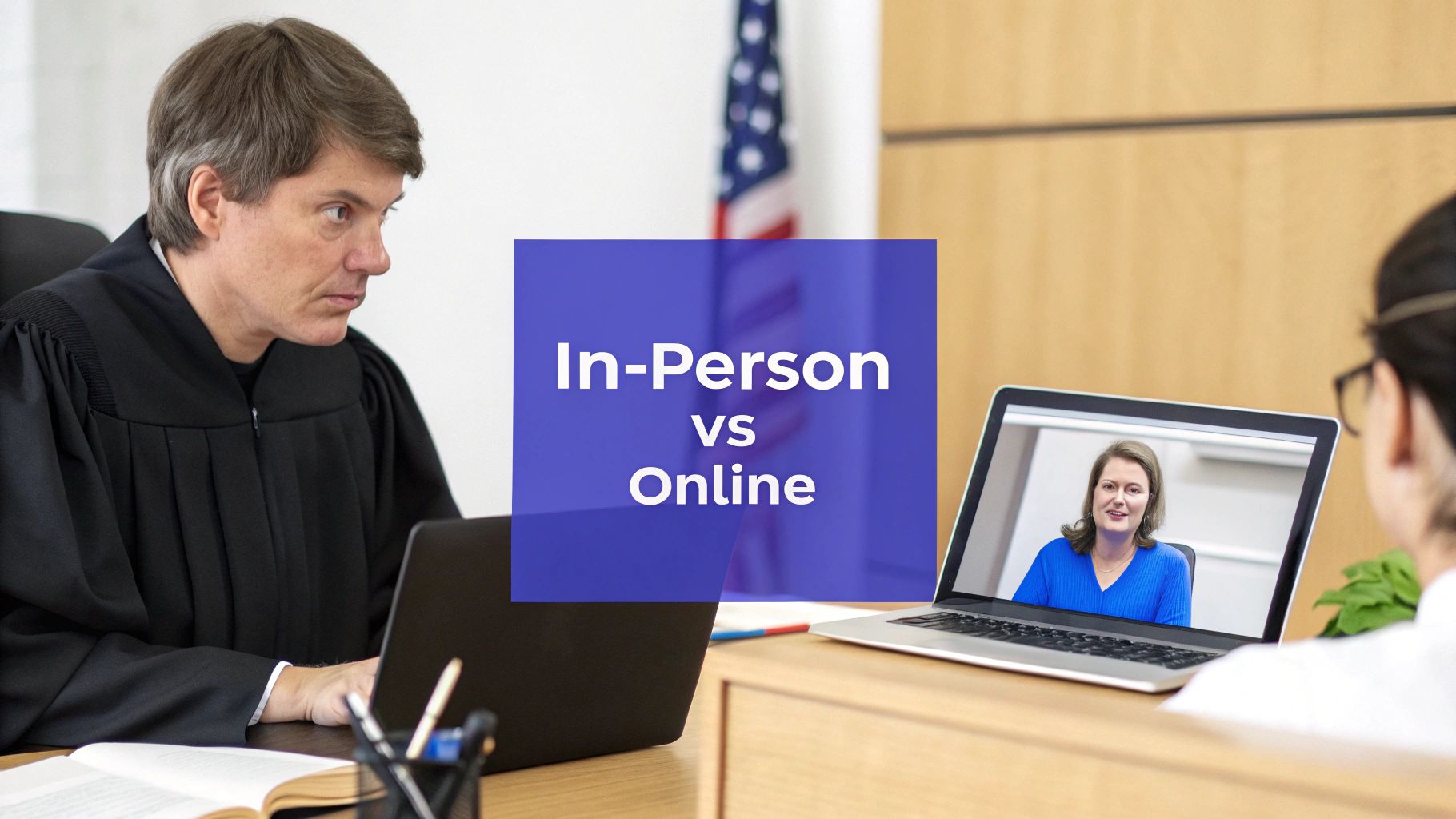
For centuries, getting a document notarized meant one thing: a trip. You had to find a local notary—at a bank, a law office, or even a shipping store—and meet them in person. This traditional method has worked for a long time, but technology has finally delivered a much-needed, powerful alternative.
Understanding the real-world differences between the old way and the new way is the key to picking what’s right for you.
With the classic in-person process, you physically bring your document and a government-issued ID to a commissioned notary. They watch you sign, fill out their notarial certificate, and apply their official ink stamp or embosser. It’s effective, sure. But it’s also stuck in a physical location and tied to someone else's 9-to-5 schedule.
The Rise of Remote Online Notarization
Remote Online Notarization (RON) completely flips the script. Instead of driving to an office, you connect with a commissioned notary public through a secure, live audio-visual platform. Think of it as a purpose-built, highly secure video call designed specifically for legal document signings.
During a RON session, the notary uses sophisticated tech to confirm who you are, often using a combination of knowledge-based authentication questions and an analysis of your ID. You e-sign the document while the notary watches live on screen. Then, they apply their digital seal and electronic signature, locking the document and making it tamper-evident.
This modern approach to notarization offers a level of speed and access that was unimaginable just a few years ago.
Key Insight: Remote Online Notarization isn't just a faster way to do things. It often layers in more robust security and identity verification than traditional methods, creating an incredibly secure and detailed record of the entire event.
The demand for this kind of flexibility is skyrocketing. The global mobile and remote notary market is projected to explode from an estimated $0.5 billion in 2025 to $2.6 billion by 2035. This isn't just a trend; it's a direct response from the legal, financial, and real estate worlds needing to get business done faster and more efficiently.
A Side-by-Side Look at Your Options
So, which method is actually better for your situation? Seeing the features compared directly makes the choice a lot clearer. Your decision will likely come down to factors like urgency, your location, and how comfortable you are with technology.
Here's a simple breakdown to help you compare.
Comparison of Notarization Methods
This table offers a straightforward look at how traditional in-person notarization stacks up against its modern counterpart, Remote Online Notarization (RON).
| Feature | In-Person Notarization | Remote Online Notarization (RON) |
|---|---|---|
| Location | Requires you to physically travel to a notary's office or location. | Can be done from literally anywhere you have an internet connection. |
| Availability | Limited to the notary's business hours, often needing an appointment. | Available 24/7 on-demand, including nights, weekends, and holidays. |
| Speed | Can take hours or even days, factoring in travel and scheduling. | The entire process is usually done in under 15 minutes. |
| Security | Relies on a manual check of your ID and a physical journal entry. | Uses multi-factor authentication, digital seals, and a secure video record. |
| Cost | Varies by state and may include hidden costs like travel and parking. | Typically a flat, transparent fee per session, paid upfront. |
Ultimately, while in-person notarization remains a valid option, the convenience, enhanced security, and around-the-clock availability of RON make it a compelling choice for most modern needs. Our complete guide to online notarization services dives even deeper into how the digital process works.
Common Documents That Require Notarization
So, you understand what notarization is. But the real question is, when do you actually need it?
Thankfully, you don't need a notary for every little agreement. Notarization comes into play for the big stuff—the documents with serious legal and financial muscle behind them. These are the life-altering agreements where you absolutely, positively need to be certain a signature is authentic and willingly given.
Think of notarization as a required safeguard for high-stakes transactions. It's the official thumbs-up that tells courts, government agencies, and banks that everything is above board. This single step is a powerful defense against fraud during some of the most important moments of your life.
Legal and Estate Planning Documents
This is a big one. We're talking about the documents that protect your family and spell out your final wishes. Because they carry so much weight—often speaking for you when you can't—the law insists on a higher standard of proof. A notary's seal provides that critical layer of security, making it much harder for the document’s validity to be challenged later on.
Common examples include:
- Wills and Trusts: While state laws vary, getting a will notarized is almost always a smart move. It helps prove that the right person signed it without being pressured.
- Powers of Attorney: A Power of Attorney (POA) is one of the most frequently notarized documents, and for good reason. It’s a powerful tool that lets someone else make critical financial or medical decisions for you.
- Affidavits and Sworn Statements: These are written statements made under oath, often for use as evidence in court. The notary's role here is to certify that the signer swore to the truth of what they wrote.
Real Estate and Financial Transactions
The entire real estate world basically runs on notarized documents. When you’re dealing with property—often the single largest asset a person will ever own—every signature has to be ironclad. A single forged signature could put hundreds of thousands of dollars at risk and throw legal ownership into chaos.
Here are a few of the non-negotiables in real estate:
- Deeds: Official documents like warranty deeds or quitclaim deeds, which transfer property ownership, must be notarized to be legally recorded.
- Mortgage Documents: All that paperwork you sign at closing, including the loan agreement and disclosures, requires notarization to protect both you and the lender.
- Promissory Notes: Think of these as legally enforceable IOUs. They often need to be notarized, especially when big bucks or property are involved.
Why It Matters: In real estate, the notary is a gatekeeper for the public record. Their seal on a deed confirms the seller's identity, which is a crucial defense against property theft and title fraud.
Business and Commercial Agreements
In the business world, notarization is all about adding a layer of official authority to important deals. It helps head off disputes down the road and gives you a much stronger legal position if a contract is ever questioned. This is especially true for documents you have to file with the state or federal government.
- Articles of Incorporation: When you’re forming a new corporation, these foundational documents usually need a notary's stamp before you can file them with the state.
- Contracts and Loan Agreements: For high-value business deals, partnerships, or significant loans, notarization gives every party an extra dose of confidence.
- Vehicle Title Transfers: Selling a car isn’t final until the title is legally transferred. That process almost always requires a notarized signature to make it official.
If you're curious about other examples, we've put together a deeper dive into the most commonly notarized documents that covers even more ground.
Of course. Here is the rewritten section, crafted to sound completely human-written and natural, following all your specific instructions and matching the provided style examples.
How to Get a Document Notarized Step by Step
Knowing what notarization is all about is one thing, but actually getting it done yourself can feel a little intimidating. This practical, step-by-step guide cuts through the confusion and gives you a clear roadmap, whether you’re heading to a local notary or using a modern online platform.
First, the most critical rule, and the one people break all the time: do not sign your document beforehand. Seriously. The entire point is for the notary to watch you sign it, or for you to acknowledge to them that the signature is yours. Signing early is the number one reason notarizations get rejected, forcing you to start all over again.
Step 1: Get Your Document and ID Ready
Before you even think about finding a notary, make sure your document is 100% complete. Every field should be filled out, except for the signature and date lines you'll handle in front of the notary. Give it a final once-over to catch any errors or blank spaces.
With your document set, grab your identification. This needs to be a current, government-issued photo ID.
- Acceptable forms of ID typically include: A state-issued driver's license, a U.S. passport, or a military ID. Expired IDs are almost always a no-go.
Step 2: Find a Commissioned Notary Public
Next up, you need to find a qualified notary. For the old-school, in-person route, many banks, shipping centers, and law offices have notaries on staff. It's always a good idea to call ahead to make sure they're available and find out their hours.
For a much faster and more convenient option, online platforms like BlueNotary can connect you with a commissioned remote notary in just a few minutes, any time of day or night. This completely sidesteps the need to travel or book appointments, letting you get everything done right from your computer or phone.
The infographic below gives you a quick visual on the kinds of high-stakes documents that absolutely depend on notarization.

This just goes to show how central notarization is to the major transactions that underpin both our personal and economic lives.
Step 3: Go Through the Notarization Process
During the actual session, the notary will walk you through a few simple but important actions. They’ll start by verifying your identity, carefully checking your ID. If you're doing it online, this part involves a slick automated analysis of the ID, followed by a few security questions that only you would know the answers to.
Depending on the document (like an affidavit), the notary might need to administer an oath or affirmation. After that, it's the main event: you'll sign the document right in front of them—either with a pen or electronically.
The final step is the application of the notary's seal. This official stamp or digital certificate is what makes the whole thing official, containing the notary’s commission information.
The notary will also make an entry in their official journal, creating a permanent log of the transaction. And just like that, your document is officially notarized and ready to go.
Answering Your Notarization Questions
Even after you get the hang of the basics, some specific questions almost always come up. It's just the nature of the beast. We've compiled the most common ones right here to give you clear, straightforward answers and help you move forward with confidence.
Think of this as your go-to spot for sorting out those final, nagging details. Getting these finer points straight is the key to understanding what it really means to notarize something and making sure you're ready for the legal weight it carries.
Can a Notarized Document Be Legally Challenged?
Absolutely, and it’s an important distinction to understand. While notarization adds a seriously powerful layer of legal credibility, it doesn't make a document bulletproof. A notary's seal creates a strong presumption that a signature is authentic and was given willingly, which makes any legal challenge a much steeper uphill battle.
However, a document can still be contested. If there's proof of outright fraud, coercion that the notary wasn't aware of, or if the signer is later proven to have been mentally incompetent, the document could be challenged. The issue is rarely the notarization itself; it’s usually the circumstances surrounding the agreement that come under fire.
How Much Does Notarization Usually Cost?
This really depends on where you are and how you get it done. Every state sets its own maximum fees for traditional, in-person notarizations, and they typically fall somewhere between $5 to $15 per signature.
Remote online notarization (RON) platforms work a bit differently. Most charge a flat fee for the whole session, which usually covers one document and one notarial seal. You can generally expect this to be around $25 to $35. It's a transparent price that gets you convenience without having to factor in gas money or travel time.
Important Note: Remember, a notary certifies a signature, not the document as a whole. If you have a single document that needs signatures from three different people, that will likely count as three separate notarial acts, each with its own fee.
Does a Notary Seal Ever Expire?
This is a fantastic question, and the answer has two parts. A notary's commission—their license to act as a notary—definitely expires, usually every four years. But the notarization they perform on your document? That never expires.
Once a document is properly notarized, that seal is good forever. It's a permanent record confirming that the signing event took place on a specific date, witnessed by a notary who was actively commissioned at that moment. Even if that notary’s commission expires the very next day, your notarized document is still perfectly valid.
Is Online Notarization Accepted Everywhere?
Yes, it is. Thanks to a solid legal framework, Remote Online Notarization is legally recognized in all 50 U.S. states. This nationwide acceptance is built on the legal principle of interstate recognition, which means each state must honor the official acts of notaries commissioned in other states.
So, you could be sitting in your office in California and have a document legally notarized by a remote notary commissioned in Virginia. The finished document is accepted as valid across the country. This makes RON an incredibly powerful tool for any business, legal, or real estate deal that crosses state lines—a modern solution for a borderless world.
Ready to experience the fastest and most secure way to get your documents notarized? With BlueNotary, you can connect with a certified remote notary 24/7 and have your document legally notarized in under 10 minutes from anywhere in the world. Visit BlueNotary to get started now.



